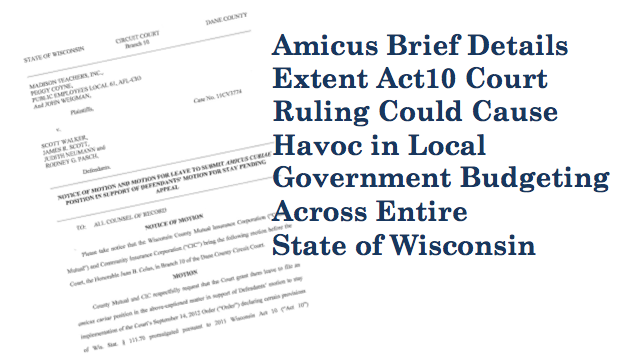
MacIver News Service | October 10, 2012
[Madison, Wisc…] Local government interests are seeking to weigh in on a controversial Dane County Court decision that has led government unions to demand new labor contracts.Dane County Circuit Judge Juan Colas struck down Wisconsin’s government labor reforms, known as Act 10, on September 14. The state is appealing his decision, and DOJ lawyers seem encouraged by the fact the State Supreme Court has already upheld it once before.
In the meantime local governments are trying to produce their budgets for next year under very tight financial restraints. Now the unions are demanding everything back they lost over the last year and a half, from sick leave payouts to lower insurance premiums.
“There’s less money coming from the state, and we don’t have the ability to tax more,” Attorney Andy Phillips told the MacIver News Service. “So every dollar we have to spend on personnel, we have to cut from somewhere else.”
Phillips provides legal counsel to 40 counties, and on Friday he asked Judge Colas to accept an amicus brief on behalf of Wisconsin County Mutual Insurance Corporation and the Communitiy Insurance Corporation, of which more than half the state’s counties are members.
The counties wanted Judge Colas to stay his decision until the fate of Act 10 is determined in higher courts. Under the current situation, counties are finding it nearly impossible to plan their budgets and deal with the unions. In the brief, Phillips argues that Colas essentially rewrote Act 10 in order to strike it down.
“The Act 10 that existed prior to the Court’s decision is not the same legislation as the Act 10 that exists following the Court’s decision,” the brief reads. “By virtue of its decision, the Court essentially rewrote the legislation to impose collective bargaining obligations the legislature clearly never intended.”
Phillips states that the judge’s decision could put local governments across the state in financial jeopardy.
“Limiting collective bargaining freed counties, municipalities and school districts to make necessary changes to costly benefit packages such as health insurance and other programs without having to provide a quid pro quo for the changes,” the brief reads. “This, in turn, facilitated the ability of counties, municipalities and school districts to maintain employment levels while still meeting the ever-increasing service demands of their taxpayers and citizenry.”
The overturn of Act 10 means local governments will have to lay off employees or cut services. If they elect to lay off employees, that will mean more unemployment claims, which will additional burden local governments with legal fees.
“In the end, the resources expended defending claims can be better spent on providing services to the citizens that rely on counties, municipalities and school districts.”
Judge Colas, denied acceptance of the amicus brief on Tuesday, saying the applicants did not offer any new perspective to the case.
“We just wanted to get our statements on the record,” Phillips told the MNS before the judge announced the denial.